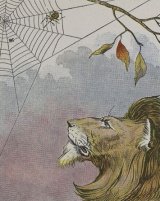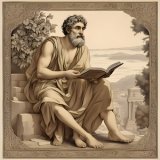The Lion and the Gnat
"The Lion and the Gnat" is a fable by Aesop that underscores the idea that physical size isn't always synonymous with power. It tells the story of an arrogant lion and a seemingly insignificant gnat. Brimming with confidence, the gnat challenges the lion, saying it won't concede even if it were defeated. Much to the lion's embarrassment, the gnat enters its nose and stings its insides, leaving the lion roaring in pain. The fable conveys the message that no creature is too small to win against the mightiest.
Genre: Children
Genre: Children
- 19 Views
"Away with you, vile insect!" said a Lion angrily to a Gnat that was buzzing around his head. But the Gnat was not in the least disturbed. "Do you think," he said spitefully to the Lion, "that I am afraid of you because they call you king?" The next instant he flew at the Lion and stung him sharply on the nose. Mad with rage, the Lion struck fiercely at the Gnat, but only succeeded in tearing himself with his claws. Again and again the Gnat stung the Lion, who now was roaring terribly. At last, worn out with rage and covered with wounds that his own teeth and claws had made, the Lion gave up the fight. The Gnat buzzed away to tell the whole world about his victory, but instead he flew straight into a spider's web. And there, he who had defeated the King of beasts came to a miserable end, the prey of a little spider. The least of our enemies is often the most to be feared. Pride over a success should not throw us off our guard.
Translation
Translate and read this book in other languages:
Select another language:
- - Select -
- 简体中文 (Chinese - Simplified)
- 繁體中文 (Chinese - Traditional)
- Español (Spanish)
- Esperanto (Esperanto)
- 日本語 (Japanese)
- Português (Portuguese)
- Deutsch (German)
- العربية (Arabic)
- Français (French)
- Русский (Russian)
- ಕನ್ನಡ (Kannada)
- 한국어 (Korean)
- עברית (Hebrew)
- Gaeilge (Irish)
- Українська (Ukrainian)
- اردو (Urdu)
- Magyar (Hungarian)
- मानक हिन्दी (Hindi)
- Indonesia (Indonesian)
- Italiano (Italian)
- தமிழ் (Tamil)
- Türkçe (Turkish)
- తెలుగు (Telugu)
- ภาษาไทย (Thai)
- Tiếng Việt (Vietnamese)
- Čeština (Czech)
- Polski (Polish)
- Bahasa Indonesia (Indonesian)
- Românește (Romanian)
- Nederlands (Dutch)
- Ελληνικά (Greek)
- Latinum (Latin)
- Svenska (Swedish)
- Dansk (Danish)
- Suomi (Finnish)
- فارسی (Persian)
- ייִדיש (Yiddish)
- հայերեն (Armenian)
- Norsk (Norwegian)
- English (English)
Citation
Use the citation below to add this book to your bibliography:
Style:MLAChicagoAPA
"The Lion and the Gnat Books." Literature.com. STANDS4 LLC, 2024. Web. 30 Apr. 2024. <https://www.literature.com/book/the_lion_and_the_gnat_2300>.




Discuss this The Lion and the Gnat book with the community:
Report Comment
We're doing our best to make sure our content is useful, accurate and safe.
If by any chance you spot an inappropriate comment while navigating through our website please use this form to let us know, and we'll take care of it shortly.
Attachment
You need to be logged in to favorite.
Log In